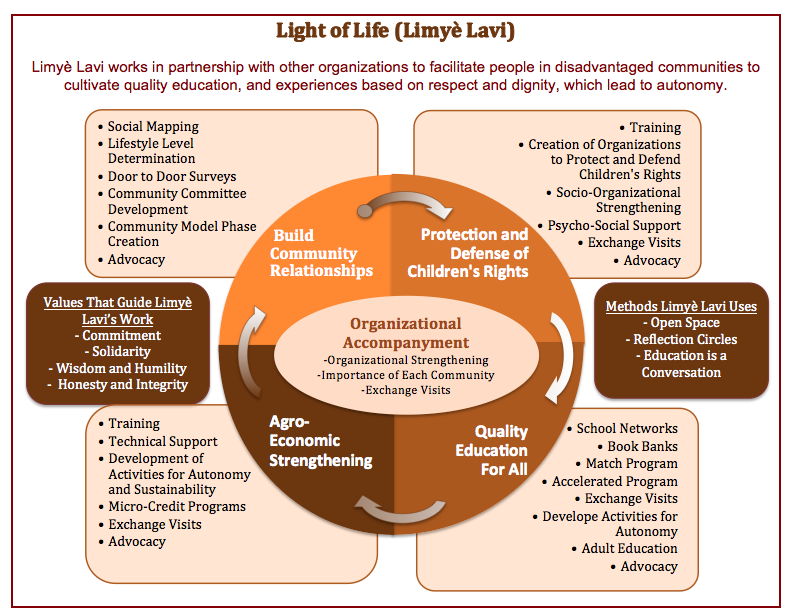The Community Model
The Model Community Initiative is the platform that Limyè Lavi has created to inform us of the specific strengths and weaknesses of each community, and is the basis of our work which is designed to decrease the number of children living in the restavèk system* in Haiti. Limyè Lavi uses experiences and best practices learned in our earlier efforts in education and advocacy where we worked to motivate people, especially in the cities, about restavèk practices and the dire consequences of this practice on children’s lives and society, encouraging them to not mistreat children who live with them, and to not bring more children into the restavèk system. Through this work Limyè Lavi decided that if it wants to solve the problem it must work at the roots, and so it has identified 12 rural communities who are known to send children into the restavèk system.
The Model Community Initiative involves a set of integrated strategies of Community Relationship Building, Organizational Strengthening, Improving Quality and Access to Education, Child Protection and Child Rights Approaches, and Agro-Economic Techniques which permit Limyè Lavi to do multiple things simultaneously. By making community members aware of children’s rights and the situation children live when in the restavèk system, the parents are motivated to go get their children, to bring them home to live with them. Studies show that two typical reasons rural families send their children into the restavèk system are to seek educational opportunities for their children, and the parents’ difficult economic conditions. By addressing these foundational reasons why people send their children into the restavèk system, Limyè Lavi is helping communities to diminish the number of children living in and entering the restavèk system through increasing the educational and agricultural production opportunities in the rural communities. Using participatory methods, Limyè Lavi strengthens the local leadership and involves each community in its own analysis and progress, thus setting the stage for sustainable change. The Model Community Initiative has shown both short-term and long-term results, and continues to grow and energize Haitian communities to improve their living conditions and opportunities, and has demonstrated effectiveness in diminishing the number of children in the restavèk system.
* The restevek system is the practice of rural families who, wanting an education that is not available in their communities, send their children to a large town or city, with the expectation that the families receiving their children will send them to school. All too often these children are not sent to school, and are required to complete difficult and dangerous household chores. Often mistreated, and disconnected from their families of birth, these children are denied a chance to have a thriving childhood, grow up in a loving and caring family, receive an education and / or develop the traits necessary to grow into a happy, healthy adult. There is currently an estimated 300,000 of these children living in Haiti.


